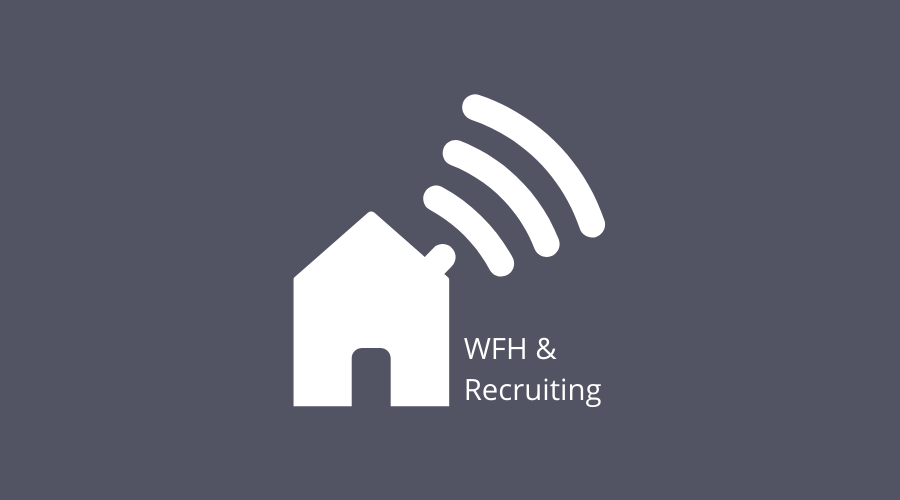Companies that want to remain competitive in the midst of a global pandemic are pursuing creative ways to stay agile to maintain continuity. This includes providing for new work-from-home (WFH) or ‘remote work’ arrangements, not only to maintain customer service, but also to retain employees. But these changes have consequences, and ripple effects in all directions.
This includes recruiting. Generally speaking, work from home has been good for attracting talent but lets dive deeper into the impacts of a remote workforce.
COMPETITION
Supply and demand analysis are the cornerstone of any good sourcing and recruitment program.
Supply: What does the local market look like? What is the approximate size of the talent pool? When sourcing talent for a role that is, or has the option to be, virtual you are no longer looking at just the local market. Your talent pool has now expanded nationwide, or even globally if you desire. With the size of your talent pool amplified exponentially, your sourcing and screening strategy requires adjustment. You can now significantly broaden the scope of your recruitment marketing, and consequently, you’ll need to add a high-volume screening process that will most likely require some form of text recruiting software, ideally coupled with an AI recruiting chatbot. If you don’t have a high-volume, text recruiting centered process that is efficient at weeding out low qualified talent and isolating top quality talent, you can get buried in an unmanageable level of applicants. If your process is not automated and communicative, you can, in effect, nationalize or globalize a poor reputation for your company, creating disgruntled job seekers all over the globe.
Demand: How many companies are hiring for the same role in your local market? Who are we up against and what are they offering? Not only has your talent pool expanded geographically, so too has the size of your competitive landscape. Job seekers who work in remote-friendly roles are no longer limited to finding work with your local competitors. Their job prospects have now expanded nationally or globally, and your advertised job opportunity is now competing for talent on a hugely greater scale, making it all the more difficult for you to stand out. You are challenged more than ever to up your marketing and engagement game.
COMPENSATION
Companies have typically determined salary ranges, based on a combination of the role itself and of the cost of living in individual geographies. There is much circulating debate on how to handle this in a work from home world. Which one will prevail? Pay people what the level of skill and responsibility is worth? Or pay people according to their local cost of living? There are varying schools of thought, each of which should be considered carefully when setting salary ranges and making offers. For some candidates, compensation is not the primary deciding factor, but for many it is. I’ve seen some recent studies that say job seekers are willing to take a lower salary in exchange for working at home exclusively.
PERKS & BENEFITS
Consider your employer value proposition (EVP). What are you touting? Do remote workers care about on-site perks like ping-pong tables, free snacks, gym, childcare, or dry-cleaning service? Absolutely not. It’s time to rethink what you can offer to attract top WFH talent. What do they want? Things like good technology to perform their roles and stay connected with a dispersed team and flexible schedules to work around childcare, particularly while waiting for schools and daycares to reopen. Benefits will certainly become more important over in person perks.
TIME ZONES & TRAVEL
This is something that you may want to address in your candidate screening process, and also something you may want to consider from a cost perspective. What will be the impact to the candidate of working outside their local working hours? Is it ideal for them because it allows for them to take care of personal commitments during the day, or is it something they would hope to adjust to? How will team members communicate and collaborate with them effectively, since in person conversations aren’t an option… text messaging, Slack, email, Zoom, phone calls? Beyond salary, what will be the level of need for this person to spend time with the team in the office or to visit clients? What will be the cost to travel this person at the needed frequency based on their home location? Some companies are requesting that remote candidates at least live in the same time zone and I expect that requirement gaining traction going forward.
COMMUNICATIONS
WFH also now requires a new mindset when it comes to communicating with your talent. Zoom and Teams are now ubiquitous but how will you communicate with your staff about the smaller details that need to be addressed each workday? This is where tools like Slack and texting come in handy to help cut through that clutter. I’d rather get a text message from HR or a team member than an email any day, so be prepared to leverage the new ways of communication if you want to maintain a good digital experience for your staff. They will expect their next employer to offer a great employee experience using the latest and greatest messaging tools.
WFH PERSONALITY
For some, work from home is new, while others have been virtual workers for many years. Some love it, some tolerate it, and some hate it. Hiring virtual workers that thrive in a virtual environment is going to be critical to success. What are some of the aspects of a strong WFH personality? Self-motivated to stay on task, disciplined to hold themselves accountable for results, flexible to balance home and work commitments, and maybe a bit introverted. When virtual work started becoming more of a thing around 10 years ago, some fell in love with it vowing to never go back, while others missed the close direction, structure, face-time, and social connection of the brick-and-mortar workplace.
If you’re recruiting for a position that is work from home eligible, you’ll likely want to consider, not only is this person a good fit for the role, but are they a good fit for a remote work arrangement? Conversely, if the role is able to be done virtually, but your company is not opening a WFH option, not only will your talent pool be reduced, but you may also be at risk for turnover as your current employees seek out that option.
Some say recruiting is recruiting, and that the same strategies can be employed regardless of the role, industry, market or economy. To some degree, that basic concept is true. But those employers who achieve the most success examine and adjust their strategies to the evolving nuances in the ways those things change. The remote work revolution has begun. Now it’s time to adapt to the new reality.


